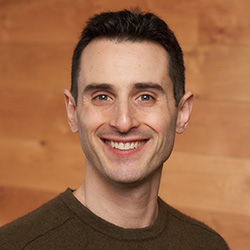Faculty DirectorySam Kriegman

Assistant Professor of Computer Science
Assistant Professor of Mechanical Engineering
Assistant Professor of Chemical and Biological Engineering
Contact
2233 Tech DriveEvanston, IL 60208-3109
Email Sam Kriegman
Website
Departments
Chemical and Biological Engineering
Affiliations
Biography
Sam Kriegman is an assistant professor of computer science, chemical and biological engineering, and mechanical engineering at Northwestern University. His research seeks general theories of life, in which the details of carbon-based organisms would represent a special case. As we have yet to invent a time machine or the means of interstellar travel, Sam and his students design, build and breed robotic lifeforms to catch a glimpse of life as it may have arisen here on Earth or as it might exist elsewhere in the universe. An AI2050 Fellow and Cozzarelli Prize recipient, his creation of the world's first AI-designed organisms (the "xenobots") triggered considerable global media attention and a tidal wave of public discourse, still ongoing, among scientists in several fields, science communicators, and the public.
Selected Publications
Kriegman, Sam, et al. "A scalable pipeline for designing reconfigurable organisms." Proceedings of the National Academy of Sciences 117.4 (2020): 1853-1859.
Kriegman, Sam, et al. "Kinematic self-replication in reconfigurable organisms." Proceedings of the National Academy of Sciences 118.49 (2021): e2112672118.
Kriegman, Sam. "Why virtual creatures matter." Nature Machine Intelligence 1.10 (2019): 492-492.
Patents
Engineered multicellular organisms. US PCT/US2021/013105; WO 2022/005527.
Engineered multicellular ciliated organisms and the kinematic self-replication thereof. US2022/0220437.